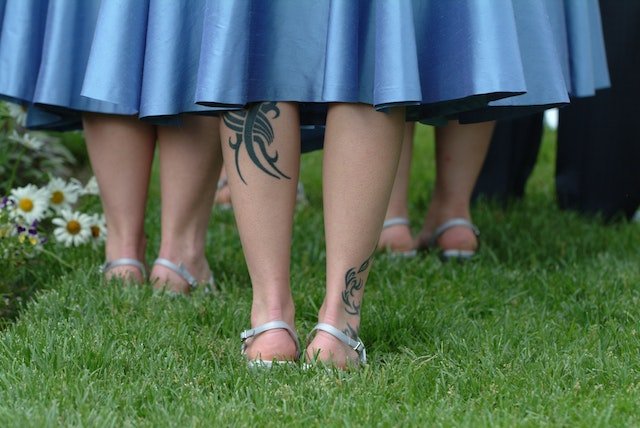
As a child I witnessed several traditions and rituals in our community.
Women sat in open garages and woven flowers of red and white tissue paper, which became gloriously bright blossoms, while the men cut fir branches and made a long wreath. The adults then hung the finished wreath on their shoulders, formed a line and then walked through the village with all the celebrants. This custom was held on the occasion of an upcoming wedding. While the men and women marched through the community and we children were in the middle of it, they sang and served spirits in small glasses. When the round was complete, they hung the wreath around the front door of the bridal house so that all those passing by could see that a wedding was about to be undergone.
On the eve of the wedding there was a bachelor party where old crockery was shattered. This was called "rumbling".
The same wreath was seen in front of the doors when a young woman turned twenty-five. Instead of flowers, other objects were chosen, including empty cigarette packets symbolizing that the woman was now an "old box" that was still unmarried. Unmarried men, who began their thirties, had to sweep the town hall market or a public square and were only freed from this task when a Virgin came along to kiss them free.
The custom first mentioned around 1890 as a sweep of the Bremen Cathedral Court is a regional custom in the biography in the form of a so-called Hansel punishment. According to the cultural anthropologist Kerstin Ehlert, this birthday custom is supposed to go back to the popular belief "that people who did not procreate during their lifetime have to do superfluous work in the hereafter".
Since the end of the 1950s, the custom has been increasingly practiced. In the meantime, the originally Bremen custom was adopted by other cities and is now widely used in northern Germany as a "stairway sweep", although the stairs of a cathedral are not necessarily to be swept. In Osnabrück (Lower Saxony), for example, the single 30-year-olds sweep the stairs of the town hall, in Hamburg the "Rathausmarkt" (square in front of the town hall). In smaller villages, such as Meine near Braunschweig (Lower Saxony), the market place serves as a "stage" for traditional customs. In Minden the custom has changed to sweep one of the many bridges over e.g. Bastau, Mittellandkanal or Weser (rivers). By such adjustments the custom could spread from Bremen in the meantime into a multiplicity of further cities. In the course of the Europeanization of all areas of life, this custom has meanwhile also found its way into other European countries, including Barcelona.
source: https://de.wikipedia.org/wiki/Domtreppenfegen (only German)
I only vaguely remember sweeping men and possibly hoped as a little girl that I would be chosen to kiss a jubilarian. But my brother, who lives in my hometown, accompanied several thirty-year-olds in their ritual of sweeping and even recorded a video of a good friend. There I watched the circle of friends making fun of the jubilant and "aggravating" him by throwing more sand on the street shortly before he finished the task. They "hänselt" him.
Hänseln was originally an initiation rite and is derived from "to take up into the Hanseatic community". After the dissolution of the Hanseatic League, it still meant mocking someone in colloquial language.
The rite belongs to a ceremony that has survived despite all adaptations of time, not in its prehistoric form with sailing rituals and bloody human sacrifices, not in those of the Hanseatic period, but - in accordance with more civilized customs - as rough, friendly fun, re-stylised for amusement, today called line baptism or baptism of the equator.
The word goes back to hansa, hanse, which initially meant flock, crowd and is common as Hanse in the meaning of trading company, trading alliance.

from Sebastian Sonntag, original artist presumably Absolon Stumme: http://de.wikipedia.org/wiki/Absolon_Stumme - Own Photo, Ausstellungsstück im Museum für Hamburgische Geschichte: http://www.hamburgmuseum.de/, Gemeinfrei, https://commons.wikimedia.org/w/index.php?curid=2784999
To "hänsel" someone is a mixture of truth-telling combined with a friendly attitude and should not be mixed with "bullying". Hänseln is a form of emphasizing a persons character traits and therefore one of social "control" or feedback within a social system.
When a couple had a baby, the "child pissing" was held and a clothesline hanging in baby's clothes and shoes was seen in the garden. Sometimes shoes hung high up in the trees.
These festivals had in common that they used a noticeable visual element
to indicate to the parishioners that a certain event had taken place or had occurred in a house and acted as a "daily newspaper" so to speak. As a child the deeper meaning became clear to me in so far as it was obvious that people wished to honour milestones in the lives of others and that those so honoured had to cope with certain tasks or were accepted into the circle of the elderly or experienced in life.
I remember a feeling of great anticipation and excitement and that it was something special for me to participate in such events. We kids didn't get much attention, but it didn't matter. The fact that the participants were sometimes exposed to quite rough jokes or had to endure quite a long ordeal did no harm to the matter, but on the contrary spiced up this common experience. They made fun of the still unmarried and used to mock the circumstance of unattachment.
In the schoolyards we sang girls songs, clapping our hands. One verse read: "When I went to Klicker-Klacker high school, when I went to high school, I was still a small and inexperienced thing. A high school student brought me home, brought me home and gave my mother a big bouquet of flowers." We played "hangman" and practiced our finger skills with strings. The more complicated and faster you formed a figure, the more recognition you got.
For some reason I like the coarse expressions and sayings of old texts better than the purified pedagogically softened and politically correct children's verses of the present time. In many of these verses the brutal truth about life was obvious: that one was ridiculed or reprimanded, that evil children ended badly and so on. There is a verbal form of hardening in it and I at least can't remember being particularly appalled or repulsed by it.
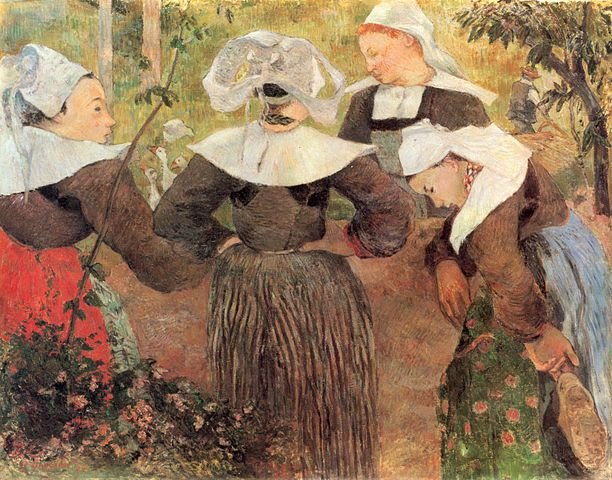
From Paul Gauguin - The Yorck Project (2002) 10.000 Meisterwerke der Malerei (DVD-ROM), distributed by DIRECTMEDIA Publishing GmbH. ISBN: 3936122202., Gemeinfrei, https://commons.wikimedia.org/w/index.php?curid=151289
Only as an adult, after I started to integrate a psychologized use of language,
did I re-evaluate my childhood experiences, which does not necessarily mean that I now got a more realistic view of my childhood experiences. On the contrary. I became a typical ego-centered adult who was more concerned with the negative experiences and emphasized those of a "traumatizing nature", such as my teachers pulling my ears. The integration into a meaningful context of ritual and custom seemed to me old-fashioned and of little relevance. Rather, I set out to attribute my self-esteem deficits to my parents' failure and, in the spirit of a Freudian tradition, to regard my parents as sexually repressed and backward. Say: To focus my attention on what I had not received and what mistakes were made on me. I have the impression that this is still widespread and that parents have to serve as the repentant par excellence of children who have long since grown up. I do not mean to diminish the psychological findings, as they are of high value.
But why are the experienced rites so strongly anchored in me?
I suppose this is because the rituals left a lasting impression and the active work of the adults had nothing to do with verbal education but with living customs. It was not theoretically educated but lived in practice. People laid hands on things. This involvement of the body has a much more lasting effect than to be taught a "belief" in a religious or secular sense.
During my research I read that belief can function without ritual but ritual cannot function without belief.
In what exactly the rituals of my childhood were transporting a particular belief I really cannot tell. But this is actually not of so much relevance to me. As it indeed served something else: a feeling to belong to people and a meaning which I could not and still cannot explain intellectually. This - so it seems to me - is exactly the purpose of a ritual. You cannot nail it down and you cannot fully and totally analyze it.
Though my analytical mind is deeply interested in getting explanations the Pagan me likes it just the way I experienced things. Instead of letting these two parts getting into fight I can leave them as they are in peaceful coexistence. But as long as I am providing you with some scientific background around this topic, the analytical aspects must be discussed, as well. The following quote is sourced here
... ritual relationships are about relationships; they are, in this sense, maximally reflexive. It should thus come as no surprise that ritual emotions, the bodily entailments of such relationships, manifest identical, self-referential, elemental qualities. Unadulterated by the negotiated contingencies of ordinary interaction, having value in and of themselves, they take on a particularly pure, rarefied form. Reciprocally, to the extent that the core domains of specific emotions are mobilized in a distinctly intense and systematic fashion, their relational potential is realized in a particularly unconditional, consummate way.
Having experienced rituals I can confirm this. It's not that I think of particular people during the celebrations I attended but more of an overall feeling of being "informed" in the figurative sense.
In another academic paper it says:
The definition of ritual is established as: “Ritual is a culturally constructed system of symbolic communication. It is constituted of patterned and ordered sequences of words and acts, often expressed in the multiple media, whose content and arrangement are characterized in varying degree by formality (conventionally), stereotypy (rigidity), condensation (fusion), and redundancy (repetition). Ritual action in its constitutive features is performative in these three senses: in the Austinian sense of performative, wherein saying something is also doing something as a conventional act; in the quite different sense of staged performance that uses multiple media by which the participants experience the event intensively; and in the sense of indexical values - I derive this concept from Peirce - being, attached to and inferred by actors during the performance" (Tambiah 1985:128).
I also remember that old women grabbed me by my chest to feel if I already grew a bosom there. This violation of my privacy was interpreted by me partly as embarrassing, partly as an interest in me and my feelings were shame, but also a kind of indignant sympathy, as I later shared such an encounter with my friends and got excited about the fact that an old woman had grabbed my breasts. I wouldn't have mentioned it to my friends if I hadn't found it significant to have been tested. Rather, I was disturbed by the absolute absence of feminine rituals that I had been longing for. I waited many years to finally get my menstrual period and was deeply disappointed when neither my older sister nor my mother honoured me.
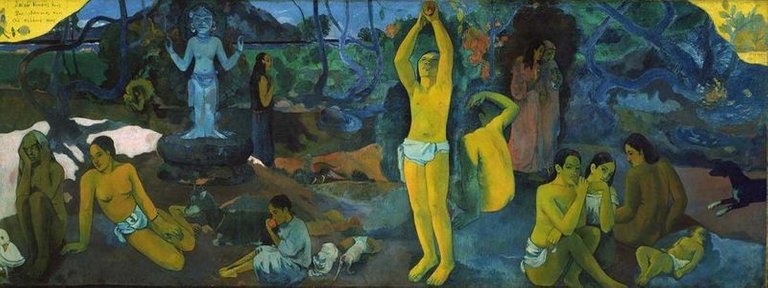
From Paul Gauguin - Paul Gauguin - Own work, public domain, https://commons.wikimedia.org/w/index.php?curid=717355
But from where actually I got my notion that encountering womanhood should not pass unmentioned? Was it a logical derivation of previously perceived rituals that led me to conclude that this entry into a new phase of life was at least as important as getting married or turning twenty-five? Where did the longing to be initiated come from, even though I had long since been educated by school? Why did it seem too cheap to me to be fobbed off with nothing and to neglect such an important aspect of my biology? Could it be that I had already read about fertility rituals or seen them on TV when I was thirteen or fourteen? And if so, why did I take this so important and could one say that literature and television are only fantasies based more on self centered wishes than on collective consciousness?
For such an idea, namely that life does not run linearly but in spirals or loops in a space-time structure, the idea of speaking of a collective symbolism that is particularly expressed in rituals is no longer so absurd. It should have become clear by now that research into culture and language shows one thing: That human narrative traditions embedded in the context of human physical activity have by far the best transmission rate in comparison to what is read or heard, which has no living connection to the listener or student.
The century that put a prize on science as its maximum achievement also gave central importance to the referential function of language. In the past hundred years, Western common sense conceived of language as parallel and correspondent to mental process. This view of verbal communication informed and dominated even traditional linguistics. In the course of the century, however, confronted with non-Western peoples, this emphasis on the function of propositionality in language began to be questioned. Despite of that, the observation of Malinowski, that “there is nothing more dangerous than to imagine that language is a process running parallel and exactly corresponding to mental process, and that the function of language is to reflect or to duplicate the mental reality of man in a secondary flow of verbal equivalents” (Malinowski 1935, apud Silverstein 1977), is an alert valid today we are still living in the domain of referentiality.
When I dove more into rituals from other cultures I found this:
Ritual of menstrual slapping
... A girl, upon confiding to her mother that she is menstruating for the first time, receives a slap in the face, preceded by congratulations and/or followed by a show of affection. The mother may accompany her action by formulae such as ‘May you have a rosy complexion all your life’ or ‘May this be the most the pain you’ll ever feel’. However, in response to her daughter’s hurt and bewildered disbelief, she can offer only woefully inadequate explanations: ‘It’s for good luck’, ‘It’s a tradition’, ‘I don’t know but my mother did it to me’.
A purely intensive understanding of emotion, one that distinguishes only between greater or lesser degrees of ‘emotional arousal’, plainly does not do justice to this event. The daughter’s hopeful anticipation of approval, the mother’s pleased concern, the traitorous nature of the dutiful slap, the mother’s comforting embrace, her chagrined attempts to explain, all form a definite emotional, embodied pattern whereby the announcement of a commonplace physiological event becomes the basis for an initiatory ritual marking the daughter’s accession to womanhood.
In other words, the participants’ emotional experience is inseparable from the relational implications of their behavior, in which such familiar interactive patterns as parental authority, domestic intimacy, mutual recognition of same-sex identity, and the de facto exclusion of male family members all come into play.

By mari - Flickr, CC BY 2.0, https://commons.wikimedia.org/w/index.php?curid=2876206
Sekihan, a traditional Japanese dish of sticky rice steamed with azuki beans, is sometimes served after menarche.
This custom of ritualizing the first menstruation with a slap in the face is known to the Jews. In the book "Menstrual Health in Women's Lives" by Alice J. Dan and Linda L. Lewis it is reported how differently the women interpreted this experience.
The slap has been taken both positively and negatively and only the difference in the interpreted view makes clear that one should better refrain from a general condemnation. A slap in the face can therefore be well-meaning and intended as a tribute from a mother as well as humiliating and warning. Depending on which spirit the mother is and what links her to the onset of her daughter's period, she will load this ritual with positive or negative power.
Admittedly, for most people this custom seems barbaric at first sight and in Western civilizations people are repulsed or alienated by physical actions that even have the suggestion of violence.
My contemporaries and I want to have a plausible explanation for everything and cannot be satisfied with accepting something only as an action. To contemplate this action without using penetrating questions and first of all taking an experience without evaluating it right through and through.
Thinking isn't always the only approach to knowledge.
The astonishment at a ritual like being slapped that cannot be explained intellectually becomes very clear when"Associate Professor Kathleen J. Wininger, of the University of Southern Maine, was slapped by her Jewish Rumanian grandmother after she announced the arrival of her first period":
"Years later when I was filming my mother for a documentary I was making about mothers and daughters I asked her about this distressing occurrence. In almost extreme close-up and what appeared to be some sort of cerebral pain, she thought and thought. Finally, her face lit up and I was about to receive the answer I had long been curious about. With tremendous enthusiasm she replied: 'I DON'T KNOW!' She went on to say something close to the effect of: Is it a custom, a superstition, is it for good luck? Don't ask me why you get slapped! YOU JUST DO!"
source: http://www.mum.org/slap.htm
Modern man cannot cope with such a statement. Even if research and self-understanding is a good thing, it is also the case that modern life threatens to wipe out community customs and ceremonies when life takes place primarily in large cities. Every event in a city seems to be bigger and more sublime than the individual, who usually no longer live in large family associations and therefore do not produce their own news at all or to such a small extent that none of it becomes visible (touchable, smellable) on the street.
Intimate modern Rituals
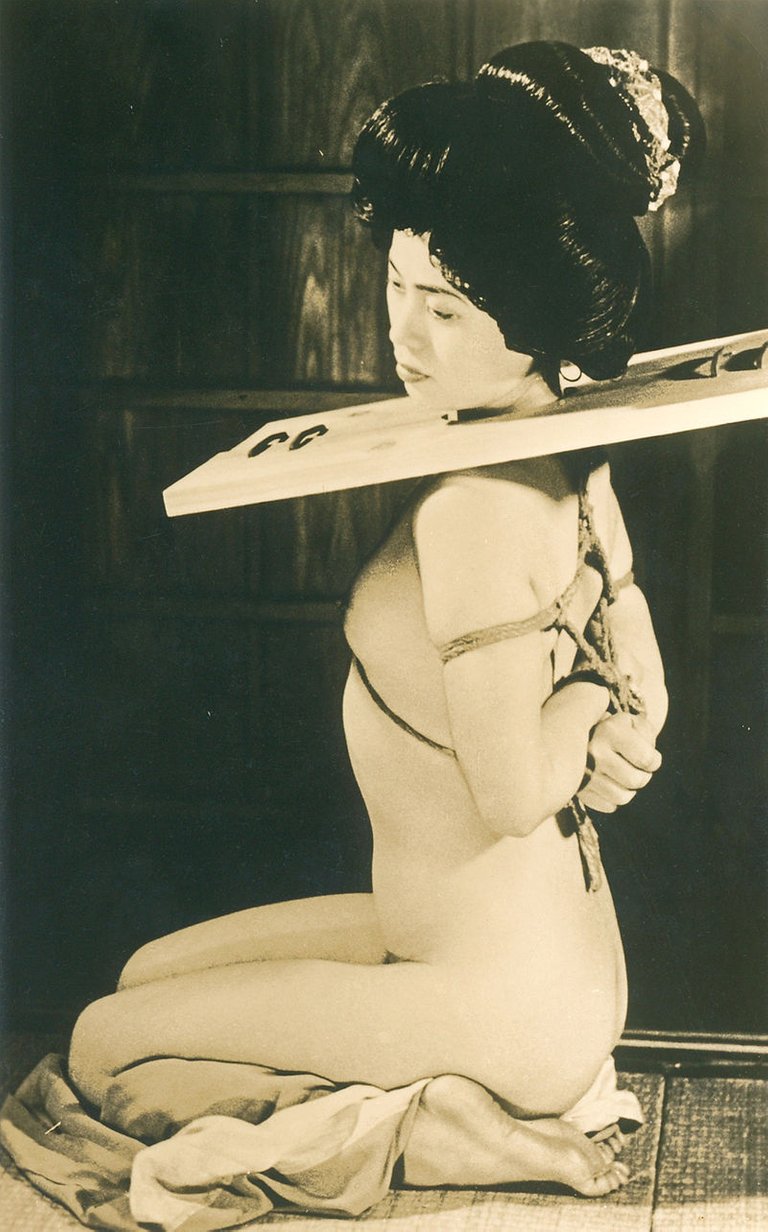
From Seiu Ito - http://blog.livedoor.jp/mrkinbakusyashin/archives/4814516.html, Public Domain, https://commons.wikimedia.org/w/index.php?curid=34599109s/sup>
Perhaps this is one of the reasons why we move into the private sphere and grow new flowers there, which have to do with intimacy as partners? In this highly individualized world, this would not be particularly surprising. A taboo, for example, is the ritual of bondage related to intimate female sexuality. The form of bondage is Japanese, in which the woman places herself in the hands of a bondage master and makes her experiences there by means of voluntarily chosen submission. Similar to the sweeping of stairs at the cathedral or the tying of boxes from formerly brutal customs or methods, Shibari could also develop into a modern ritual (or is it perhaps already) which is about art as well as sexuality and which receives a strong symbolism through the act of binding between man and woman. Since here the woman usually hands herself over to the man and tying the ropes requires a high level of skill and sensitivity, this form of intimate ritual is an act of mutual trust. Shibari evolved from Hojōjutsu, the origin of Japanese bondage. The restraints were given to prisoners to keep them from escaping or to humiliate them. Whether openly or privately, rituals and celebrations seem to be of high significance to us humans. We cannot do without them. I would like to almost finish this article with Joseph Campbell, who said that ... "Elementary thoughts ... about the structure of human life have been a vital orientation in the life of every human being, which humans in today's time would no longer have. There were no convincing myths with which this sense and orientation of one's own life could gain. source: German Wiki translated into English I think this statement also applies to rituals, which are closely connected to myths and whose origins can often be traced far back into ancient times. What disturbs me is that it seems that the cult of consumption became dominant of vast areas of the planet, which leaves us to be responsible. Must we indeed make other people equal to us? Isn't there space for leaving the non-understandable untouched? Who is "we" in this context? if all exoticism is a kind of difference, not every difference is exotic; difference compares and evokes relationships, while exoticism separates and isolates; difference produces comparative (political) theory, exoticism produces militancy, but apart from ethnography. In an intentional way, narratives have become a rhetorical option for some anthropologists; in a less conscious way, analyses of events have caused us to examine some basic presuppositions of social life, sometimes delving into (Durkheimian) elementary forms. I thus propose that the analysis of rituals/events has an elective affinity with the option for difference - that we must explore in its endless possibilities. source - Page 22: http://dan.unb.br/images/doc/Serie272empdf.pdf Just the other day I told a friend about the customs of my childhood and she was very surprised that she had not experienced even one of them herself. We live in the same country, but the small communities that make up Germany are still alive and the people who have outgrown them and migrated to the cities still remember them. Sometimes I have the impression that the interest and academic chairs outstrip the existing customs and traditions of the people and soon have to make do with the past to investigate local events. Are film-makers and researchers in a future, as a majority, confronted with tradition-preservers and their new developers and isn't the desire for knowledge already quite involved in people no longer spending time on rituals and customs, since they are too busy discovering them in others and therefore lacking contemporary customs, or is this merely - and hopefully - just a subjective impression of me, since the world seems so small to me in front of my screen? Please, enlighten me and tell me whether there is a place in your life for living and even experienced celebrations and rituals. Which ritual have you met, dear reader, and which would you like to share with me and the others in the form of your description? I also want to thank @insight-out for our recent exchange and her recommendation of rituals from her own culture. You can find them here: source Text references: SÉRIE ANTROPOLOGIA - THE ANTHROPOLOGICAL ANALYSIS OF RITUALS by Mariza G.S. Peirano - source François Berthomé, Michael Houseman. Ritual and Emotions: Moving Relations, Patterned Effusions. Religion and Society, Berghahn, 2010, 1, pp.57-75. <halshs-00658148> - source Recommendation: Other sources: Title picture: by Blake Newman / Pexels
In addition, every mythology has the task of regulating the social coexistence of the tribe, the city, the state and ensuring a harmonious coexistence. These were to a large extent adapted to local characteristics - especially geographical ones - while outsiders - for example for the Egyptian and Greek culture - were regarded as barbarians, heathens or not at all as people in the real sense and were treated accordingly. The local restriction would be found in (almost) all mythologies: "the social function of a mythology does not ensure that the mind opens, but causes an encapsulation, so that the local population thereby finds mutual support and is bound together."
Thank you very much for reading!
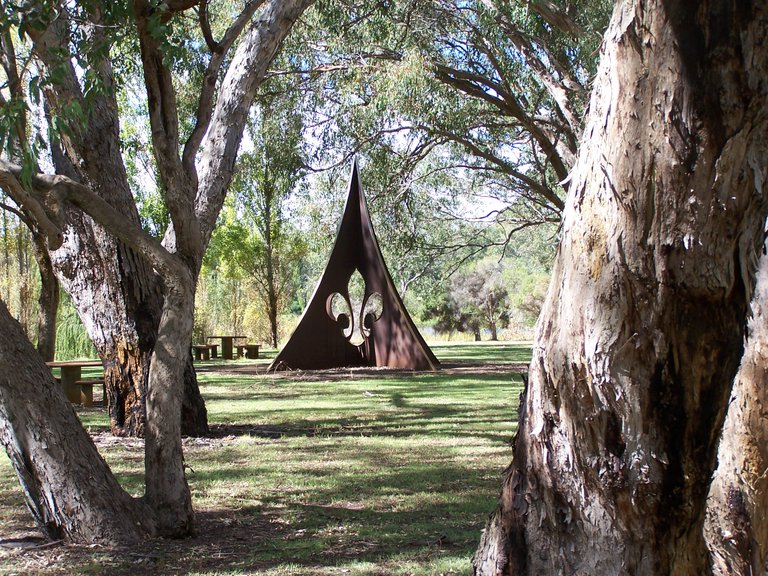
By Photographs by Gnangarra...commons.wikimedia.org, CC BY 2.5 au, Link
Ritual Theory, Ritual Practice by Catherine Bell - Oxford Press - source
- Sweeping places: https://de.wikipedia.org/wiki/Domtreppenfegen (only German)
- Hänseln: https://de.wikipedia.org/wiki/Hänseln
- Hanse: https://de.wikipedia.org/wiki/Hanse
- Menstrual Health in Women's Lives" by Alice J. Dan and Linda L. Lewis
- The Tradition of Slapping Our Daughters - By Caren Appel-Slingbaum: http://www.mum.org/slap.htm
- Paul Gauguin: https://de.wikipedia.org/wiki/Paul_Gauguin
- Shibari: https://de.wikipedia.org/wiki/Shibari
- Hojōjutsu: https://de.wikipedia.org/wiki/Hojōjutsu
- Émile Durkheim: https://de.wikipedia.org/wiki/Émile_Durkheim
- Joseph Campbell: https://de.wikipedia.org/wiki/Joseph_Campbell
- Visual anthropology: https://en.wikipedia.org/wiki/Visual_anthropology
A thought provoking read. I can't attest to having experienced any similar rituals, although Christmas had a few family traditions which may have been a little different and my maternal grandmother liked to try and keep some little rituals like gifting each of her granddaughters The Seven Year Old Wonder Book on their 7th birthdays. It could be worth noting that she was German and our Christmas rituals likely came from her and our Rudolf Steiner school influences.
Traditions certainly work better with some context and positive intent behind them. I recall a Caucasian girl who lived in an African community which did the female genital mutilation ritual when they reached a certain age. Not being native, she could have avoided this ritual, but chose to do it because she wanted to feel included with her friends and the community. As an adult after returning to the US or UK (I forget which) she had no regrets about it, so I guess it was accompanied with love and support from the community at the time. She spoke up about it to try and stop assumptions that it was purely abuse, which it certainly would be without any context or care behind it and I would imagine it would quickly be dropped as generations choose to leave it behind.
Thank you very much for reading and commenting on this theme. I read with interest the example you gave and can only confirm full heartedly that rituals need a context and an attitude which honors what the ritual gives to the participants. When this is given, the action itself can contain violence in both physical as psychological form but is carried by the members of the community resp. those involved.
So, your anecdote contains quite some importance, it is a genuine description and not a theoretical assumption.
I feel I/we need much more of those anecdotes in this time of being. I would like to start publishing those kinds of stories but never got people in bigger numbers to take part. Do you think it'd be worthwhile to spend some time on it here on hive?
In my last blog post I featured Margaret Mead. If you are interested, watch the video at the bottom of my post. I loved to watch it.
Can you also say something more about your grandmothers "Seven Year Old Wonder Book" and what it contained? You don't have a sample, by chance? ...
:) Rudolf Steiner, yeah, he was quite making a difference.
Greetings.
It was a collection of stories. I actually didn't realise it was Waldorf philosophy based.
https://www.goodreads.com/book/show/4967.The_Seven_Year_Old_Wonder_Book
The question is, will you find it worthwhile?
:) It's always worth my while, when I take up things of my interest.
When you skim through my blog entries, you'll find many related texts which refer to family, history and traditions. Oftentimes I tried to inspire and engage readers to think about their own and, if possible, to give examples from their experiences and memories. Only rarely I got response in the form of shared stories. That I answer with the fact that not enough people were either having those kinds of stories or, I did not have enough readers or support from the crowd. I guess, I would have to ask other community actors to take part.
So I ask back: would you be interested?
Interesting to read the comments from your link. In my own childhood, nobody read me books or told bed time stories. I totally lack this on my own but did it frequently and with joy to my boy. By the way, do you have children, if you allow me to ask?
Then it's worth doing on Hive. 😊
I’m not entirely sure what stories you're thinking of, but happy to converse, share and answer questions.
I have two daughters and bedtime stories were a tradition for us. My mother read to us on occasion, but not regularly. I still may have developed the habit with my girls from those memories.
I didn't actually look at the comments, I'll go do that now.
Hello, dear Erica! I was waiting for this post and somehow I missed it! :( We live on the Black Sea coast now and we have a lot of guests visiting us during the summer. So, these days I find it extremely difficult to find time for Steemit (given the fact that I also have a six-months-old baby :D).
You did an amazing analysis! Your thoughts about the first menstruation (or becoming a woman) reminded me of my first experience with the systemic approach. I joined a therapeutic group which theme was "Feminine nature". I liked the theme, but later I fell in love with the systemic approach. Most of the time we examined different female fairytales. Actually, we focused on this book - I guess you know it. The author is a Jungian psychologist, but our therapist introduced us to the systemic view of the tales in the book.
Unfortunately, I have the same (subjective) impression as you do. I am afraid that our society is getting too individualized, people become too alienated and detached of their own experiences. The rituals help you realize the grand changes in your life and support you during transition times. We no longer have that and we behave like being lost - not knowing who we are, what is our place or what should we do next ...
All the best!
Valeria
Thank you, Valeria! I was hoping that you swing by :)
But vacation with the family is way better! You've got a baby! My late congratulations to you.
Soon there will be another baby in my family, too. My niece will give birth to a boy. I initiated her during her pregnancy through a little ritual.
I am glad that you share this view on rituals with me and that there are still women on earth who see the deeper meaning in it. Unfortunately boys - I think - lack more of being welcomed into manhood.
Therefore I am happy that my 13 year old attended Boy Scouts camp the last three summers and came back somehow changed and proud of having endured the physical efforts.
Yes, we are emphasizing individualism nowadays. So we've got work on our hands:)
oh, and thanks for the book recommendation. I haven't read it so far.
Thank you for your congrats, Erica! My son is still a baby yet but I am thinking about Boy Scouts when he grows up, too - I think it is a great experience for a child!
We did something like a baby shower when I was 9-months pregnant but we skipped the presents and made it more like an initiating ritual - my sister invited my girlfriends and we talked about pregnancy, birth, and childcare. Everyone shared their experience, feelings, memories or thoughts. Two of my friends came from across the country and traveled nearly 500 km just because they found it important to came and support me. That is how powerful rituals (and good friends) are :)
It is funny that you say that. Every time when I feel desperate or frustrated by the events in my home country or the around the globe, I say the exact same thing!!! :D
Indeed! It delights me to hear that.
High five, "soul"-mate ;-)
I'm afraid category "zero celebrations and rituals" fits me perfectly, unless you count morning routines (like "ritual" of making coffee) as ones.
The only things I can remember to be celebrated in a community are birthdays and weddings - other than that everything is rather celebrated with the closest family only.
I guess I went through one ritual - I was joining motorcycle group (only antique motorcycles) and I was riding.... obstacle course (?), something like that :) Just for fun, but it still was a test to check your abilities.
Anyways, I wonder, maybe we exchanged rituals and celebrations you are talking about into highly formalized ones (Holy Communion, school certificates ceremonies etc).
Therefore community in a sense became "obsolete" and with it - rituals (you don't belong to group, then you don't take part in their customs).
Then the road to forget customs or simply not following them is rather straight forward.
Have a nice day! =3
Thanks, Konrad!
Does that mean that you don't miss to be part of a group which celebrates rituals or to have undergone a certain ritual during your puberty? Something like solving a certain task to encounter manhood?
Joining the motorcycle group: were there some acknowledgements involved after you succeeded in riding the course?
And what about finishing your first school education? Did your school organized and celebrated all the students who left school? Prom is such a tradition.
Tests of courage, when they are held in the right context and with the necessary seriousness, seem to leave an important impression on people when the participant experiences or is accompanied by his limits. It must not be too lapidary or insurmountable, but just difficult enough to make you struggle, overcome certain fears and then feel different than before.
I don't like the thought community becoming obsolete... it leaves people in isolation or only connecting online ...
I think I can say I don't miss being a part of a group, but I for sure know when exactly (for me) transition between kid and man happened - and it happened without any group, not even close to ritual or celebration. Sorry for being vague here, but I don't feel like sharing it in the public :)
About motorcycles: there were actually! It turned out later that they were giving points and I managed to get 3rd place somehow.
I had prom and few other celebrations, but never really cared. I was raised in a small town, we knew each other very well :D It was more like another meet-up.
Never had a test of courage, except ones that life made for me or I decided to take on my own :D
I don't like that thought too. I might not fell the need for community in a strict sense, but isolation is not good either. Plus, somewhere deep down inside I still feel like a part and depend on a community - we just not see each other directly.
This post has been voted on by the steemstem curation team and voting trail.
There is more to SteemSTEM than just writing posts, check here for some more tips on being a community member. You can also join our discord here to get to know the rest of the community!
Hi @erh.germany!
Your post was upvoted by utopian.io in cooperation with steemstem - supporting knowledge, innovation and technological advancement on the Steem Blockchain.
Contribute to Open Source with utopian.io
Learn how to contribute on our website and join the new open source economy.
Want to chat? Join the Utopian Community on Discord https://discord.gg/h52nFrV